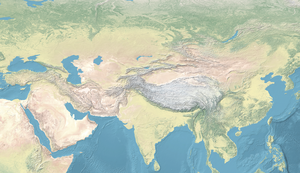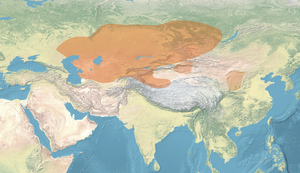
Back Massagete Afrikaans ማሳጌታያውያን Amharic Masachetas AN Massagetlər Azerbaijani ماساگتلر AZB Масагеты Byelorussian Масагети Bulgarian Massàgetes Catalan Massagetové Czech Massageterne Danish
Sakā tigraxauda Massagetae | |
|---|---|
| c. 8th century BCE–c. 3rd century BCE | |
| Common languages | Saka language |
| Religion | Scythian religion |
| Demonym(s) | Sakā tigraxaudā Orthocorybantes Massagetae |
| Government | Monarchy |
| King or Queen | |
• c. 530 BCE | Tomyris |
• c. 520 BCE | Skuⁿxa |
| Historical era | Iron Age Scythian cultures |
• Established | c. 8th century BCE |
• Disestablished | c. 3rd century BCE |
| Part of a series on |
| Indo-European topics |
|---|
 |
The Massagetae or Massageteans, also known as Sakā tigraxaudā or Orthocorybantians, were an ancient Eastern Iranian Saka people[1][2][3][4][5] who inhabited the steppes of Central Asia and were part of the wider Scythian cultures.[6] The Massagetae rose to power in the 8th to 7th centuries BCE, when they started a series of events with wide-reaching consequences by expelling the Scythians out of Central Asia and into the Caucasian and Pontic Steppes. The Massagetae are most famous for their queen Tomyris's alleged defeating and killing of Cyrus, the founder of the Persian Achaemenid Empire.[7]
The Massagetae declined after the 3rd century BCE, after which they merged with some other tribes to form the Alans, a people who belonged to the larger Sarmatian tribal confederation, and who moved westwards into the Caucasian and European steppes, where they participated in the events of the Migration Period.[7]
- ^ Schmitt 2021.
- ^ Schmitt 2018a.
- ^ Diakonoff 1985.
- ^ Grousset 1970, p. 547.
- ^ Gera 2018.
- ^ Unterländer 2017: "During the first millennium BCE, nomadic people spread over the Eurasian Steppe from the Altai Mountains over the northern Black Sea area as far as the Carpathian Basin... Greek and Persian historians of the 1st millennium BCE chronicle the existence of the Massagetae and Sauromatians, and later, the Sarmatians and Sacae: cultures possessing artefacts similar to those found in classical Scythian monuments, such as weapons, horse harnesses and a distinctive ‘Animal Style' artistic tradition. Accordingly, these groups are often assigned to the Scythian culture... "
- ^ a b Olbrycht 2000.
© MMXXIII Rich X Search. We shall prevail. All rights reserved. Rich X Search

